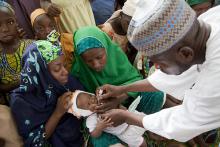 These parents are a product of the system and a reflection of what is going on in the country. So instead of just pointing fingers at them, let us usei have a bun an eagle eye to understand the root causes of this issue.
These parents are a product of the system and a reflection of what is going on in the country. So instead of just pointing fingers at them, let us usei have a bun an eagle eye to understand the root causes of this issue.
Should parents who refuse to vaccinate their children be prosecuted? Absolutely not! I believe that this will not bring about any solution, but will rather fuel more anger and outrage in the country. The inability of Nigeria to get all of these parents to vaccinate their children with the polio immunization is as a result of a systemic failure. These parents are a product of the system and a reflection of what is going on in the country. So instead of just pointing fingers at them, let us use an eagle eye to understand the root causes of this issue.
For this write-up, I will like to focus on two root causes. First is the influence of political/religious leaders in the country and second is the lack of education in Northern Nigeria.
In a country where religion is a powerful tool, people can be easily misled by the huge influence of these religious leaders. In 1988 the World Health Organisation (WHO) launched the Global Polio Eradication Initiative (GPEI) with a goal of eradicating polio. In 1996, the Kick Polio Out of Africa campaign was also launched by President Nelson Mandela and 45 other Heads of State in South Africa. During this time, it was reported that the number of cases of polio in Nigeria decreased from about 990 in 2000 to 300 in 2002. Nigeria was on its way to eradicating this acute viral infectious disease. However in 2003, the political and religious leaders in Kano, Zamfara and Kaduna states told parents not to immunize their children because they believed that the vaccines could contain anti-fertility agents, HIV and cancerous agents. This led to the immunization coverage being stopped. Although this was finally resolved and in 2004 immunization continued, the seeds of ‘do not allow your children to receive polio vaccines’ had already been planted in the minds of these parents.
The lack of education in Northern Nigeria is another major factor. Education empowers you to correctly analyse information in order to make informed decisions. All of the high-risk states where there are still persistent transmission are in the Northern part, with very high level of uneducated people. Majority of the adults there have not visited the four walls of a school and the children are not motivated to go either. The South of Nigeria, where people are more educated is free of polio. The lack of education and high level of ignorance exhibited by the parents in the North is reflected in the recent report (March 2012) by the United Nations on the Polio Eradication Initiative in Nigeria. The data analysis revealed that 25% of care givers/parents felt there was no need for the vaccination, 11% felt there were too many rounds, 8% were still worried about the effectiveness and safety of the Oral Polio Vaccine (OPV), while 22% gave no reason.
Instead of prosecuting parents who refuse to vaccinate their children, I would suggest that the Federal, State and Local governments continue to work together to increase the level of advocacy and community engagement in these high-risk states. More health education classes should be conducted in the communities to increase understanding of the importance of routine immunization and if necessary, incentives should be offered to parents who allow their children to be vaccinated. Political and religious leaders should also come out to support the cause and be a voice for pro-immunization.
[…] Temie Giwa argues that parents who refuse vaccination be prosecuted in this interesting piece. Hez Shobiye and Maimunat Adeomi both argue for soft power in getting suspicious parents on the same side as the […]